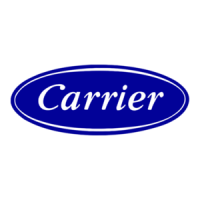36
Legend
O Open
F Closed
Water inlet
Water outlet
Pressure gauge
If the pressure drop has increased, this indicates that the
screen lter must be removed and cleaned, as the hydronic
circuit contains solid particles. In this case, in units with option
293 or 293A, close the shutoff valves at the water inlet and
outlet and remove the screen lter after emptying the hydronic
section of the unit. In units without option 293 or 293A, clean
the screen lter on hydronic circuit out of the unit.
Renew, if necessary, to ensure that the lter is not contaminated.
When the circuit is cleaned, read the pressures at the unit
(entering water pressure - leaving water pressure), expressed in
kPa to nd out the plate heat exchanger pressure drop.
Compare the value obtained with the theoretical selection
value. If the pressure drop measured is higher than the value
specied this means that the ow rate in the plate heat
exchanger (and thus in the system) is too high. The pump
supplies an excessive ow rate based on the global pres-sure
drop of the application. In this case close the control valve
one turn and read the new pressure difference.
Entering water pressure reading
Leaving water pressure reading
Example: Unit with a given nominal ow rate of 4.8 l/s
Waterowrate,l/s
Legend
1 Unit pump curve
2 Plateheatexchangerpressuredrop(tobemeasuredwiththepressuregauge
installed at the water inlet and outlet)
3 Installationpressuredropwithcontrolvalvewideopen
4 Installationpressuredropaftervalvecontroltoobtainthespeciedowrate
Pressure drop, kPa
1
2
3
4
0
25
50
75
100
125
150
175
200
2
4
6810
11 - NOMINAL WATER FLOW CONTROL WITH
VARIABLE-SPEED PUMP
11.1 - Pump fow/pressure curve
61WG/30WG/30WGA units with variable-speed hydronic
module include a water pump that automatically adjusts the
ow to maintain a constant pressure or constant temperature
difference.
No control is required at start-up, but the control mode must
be selected at the unit interface (refer to the 61WG/30WG/
30WGA Pro-Dialog+ Control manual).
Proceed by successively closing the control valve until you
obtain the specic pressure drop that corresponds to the
nominal ow rate at the required unit operating point.
• If the system has an excessive pressure drop in relation
to the available static pressure provided by the pump,
the resulting water ow rate will be reduced and the
difference between entering and leaving water temperature
of the hydronic module will be increased.
To reduce the hydronic system pressure drops, it is necessary:
• to reduce the individual pressure drops as much as
possible (bends, level changes, accessories, etc.)
• to use a correctly sized piping diameter.
• to avoid hydronic system extensions, wherever possible.

